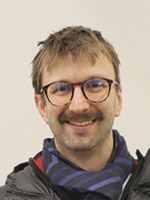Election to the University board
About the election to the University board.
The election period is from May 19th until May 26th. 2025.
The term of office is one year, from the 1st of august 2025 untill the 31st of july 2026.
You can read more about the Board elections at OsloMet here.
How to vote
eValg for OsloMet will be opened Tuesday the 19th of May and the election period lasts until 26th of May 2025. Go to eValg (valg.oslomet.no) to cast your vote. (will be possible when the election period has started) Log in with your OsloMet username and password.
Only academic staff with tenure in at least a 50 % position may nominate. Some leaders and a few other positions are not eligible and may not be nominated, se the election rules §§ 10 and 12, or contact the election secretaries.
All eligible voters shall be registered in the census and will be contacted by email no later than week 18.
The result will be ready early june 2025.
Presentation of the candidates
Three candidates were nominated. You can read the presentation of each candidate below.
-
Madeleine Simmons

I’m a PhD fellow at the Faculty of Health Sciences, Institute of Rehabilitation Science and Health Technology. Before academia, I studied as a physiotherapist in Canada, and gained experience in community and acute care settings, focusing on musculoskeletal conditions, chronic pain, and stroke rehabilitation. Alongside clinical work, I was involved in curriculum development (Peer Assisted Learning (PAL) programs), peer mentorship, and equity, diversity, and inclusion initiatives in higher education.
Since moving to Norway, I’ve brought with me a deep curiosity about how systems shape people’s experiences of health — and how we can use research and education to promote meaningful, lasting change. My Ph.D. project explores how adverse childhood experiences impact healthcare use for pain and mental distress, with an eye toward promoting health equity.
I’m proud to be part of a university that values interdisciplinary collaboration, and I see real potential in creating more spaces for early-career staff to influence the university’s direction and culture.
-
Cedrik Andersen Lyngroth

I’m running for the University Board as a representative for temporary staff at OsloMet. I want to use my experience and knowledge to work for security, wellbeing, and strong future prospects for all of us in temporary positions.
Higher education is facing tough financial priorities, and it’s important that we are not forgotten in budget decisions. With my background from previous positions at both OsloMet and the University of Bergen (UiB), combined with my background in economics through my studies in economics and business administration, I want to ensure that the interests of temporary staff are taken seriously in all budget processes.
In the last year, I’ve gained experience from both the Faculty Board and the Department Council for Social Sciences at OsloMet. Along with previous roles at UiB (University Research Committee, Museum Board, Council for Cooperation with Working Life, and the Student Parliament) and UiA (as elected student representative for business administration in Grimstad), this has given me a broad understanding of how the university functions – and, just as importantly, what everyday life looks like for temporary employees. I aim to use that insight to be a clear and constructive voice for our interests in the University Board.
I want to represent all temporary staff at OsloMet. I’m trained both as an economist and a teacher and currently work at the Department of Social Work, Child Welfare and Social Policy. This interdisciplinary background gives me a solid perspective on the different challenges faced by temporary staff across faculties.
It’s important to me that you, as a temporary employee, feel seen and heard. My door – and inbox – is always open, and I want to be an approachable and active voice for you. As your representative, I will be visible and available, and I will work to make sure the voices of temporary staff are heard in the university’s decision-making processes.
I hope to earn your trust and the chance to work on your behalf – for security, wellbeing, and a brighter future for all temporary employees.
-
Andreas Lillebråten

I am running for the University Board at OsloMet because I want to be a strong and constructive voice for temporary employees – someone who brings forward the issues that matter to us. As a deputy board member over the past two years, I have regularly taken notes when temporary staff have discussed their working conditions. These are recurring issues, and ones I will actively work to improve:
Salary
OsloMet has not traditionally prioritized temporary employees in local salary negotiations. This is particularly problematic given that, as of last year, a larger portion of the salary framework has been shifted from central to local negotiations. Research assistants are highly educated and could receive better pay in other roles. It is therefore crucial that they have a real opportunity to put forward demands – and to succeed – in local negotiations.
For PhD students, the situation is somewhat different. They receive an automatic annual salary increase of three percent during their three- to four-year employment. However, many are in a life phase where they are starting families. If the PhD period is extended due to parental leave, this automatic increase stops at the end of the original contract. As a result, PhD students with children may end up earning significantly less toward the end of their project. It is therefore essential that PhD students also have the opportunity to submit and succeed with local salary requests.
Social and Academic Environment
Being temporarily employed at a university can feel isolating. Many colleagues work independently and often from home. While this is difficult to change completely, OsloMet should set clear expectations that both supervisors (for PhD students) and project leaders (for research assistants) are regularly present on campus. This lowers the threshold for contact and strengthens the academic community.
Working Conditions
Starting a position as a research assistant or PhD student means entering a workday that is often unfamiliar and unclear. Many feel uncertain: What are the rules for working from home? What funds do I have access to, and how can they be used? Who do I contact in case of a conflict? New employees would avoid much confusion if they received better information on these matters – for example, in the form of a simple brochure.
Artificial Intelligence
I coordinate my faculty’s initiative on generative AI and have also led several introductory courses on ChatGPT and similar tools. I see great variation in how these tools are used – from simple tasks like translation to more advanced applications involving content generation and rewriting.
Temporary employees are often more cautious, afraid that using these tools might be seen as cheating. This can lead to missed opportunities. OsloMet must provide clear, practical guidelines and offer relevant training that shows how these tools can be used in a responsible and academically sound way.
